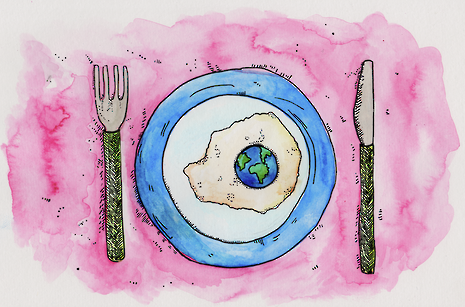Vegetarianism, the planet & me
In her first column on making lifestyle changes as a result of the climate crisis, Jess Molyneux discusses her switch to a vegetarian diet

No one ever seems to know what I’m talking about when I say, with a sigh of wistful nostalgia, ‘Billy Bear meat’. Available from the deli counter in all good Manchester supermarkets, this sliced sandwich meat in the shape of a bear’s face (with pop-able eyes!) kept my sister and I placated for hours of weekend food shops.
From munching this questionable delicacy, to routinely ordering meat feast calzones, I was definitely a childhood carnivore. Later, getting more nutrition-conscious, the red meat craving was quelled, but my mum’s chicken curry or turkey burgers still took top spot. Family teas were meat and two veg, with the occasional experimental venture with cheese or Quorn. I can’t place the turning point precisely; university didn’t convert me immediately, but I pretty quickly found myself opting for the vegetarian option in caff as default. Only my dislike of absolute rules (what if, just one time, I really wanted chicken?) was holding me back. Until, that is, my identical twin sister tried the six-week veggie pledge, succeeded, and decided to carry it on into the new year. Well, I couldn’t very well let her win on ethics, so vegetarian for 2019 it was. One goodbye Christmas dinner, and we were off. Who knew twin rivalry was so good for the environment.
So far, I’ve been having a ball. My tendency to obsess and stress over choice evaporates when there are only two options on a menu. The ease of going meat-free at Cambridge, too, made my transition smooth, and luckily my parents are happy to get on board back home. But I know I’m in a vegetarian bubble: this summer, with a group of friends who are all uni-bound, all concerned about the climate crisis, I was shocked to find myself the only vegetarian when we arrived at Edinburgh’s best hog roast establishment. My sneaking suspicion is that most of them will go more, if not fully, meat-free at uni. There’s something about the university environment where conversations are constantly taking place (in hall, at speaker events, in college societies), where there are more vegetarians and vegans around than I’d ever met before, where almost everyone is of the right age to feel that the future of the planet depends on them.
“We need everyone to make fifty, sixty, seventy percent of the effort, rather than an ordained few going all the way”
But I fluctuate between thinking that we’re on the way and feeling that I must be in an echo chamber. My whole household has changed; I see many friends following suit; there are veggie Prets in London and, now, in Manchester. But I also see major opposition to proposed meat-free Mondays in college hall, and blank faces, or chuckling dismissal, when I explain that I’m an environmental vegetarian. Given the necessity of collective action for dietary solutions to have any real impact, it’s demoralising to realise that environment-friendly eating is still a minority movement.
Then there’s the pressure from the other side, the feeling that you haven’t gone far enough, that you should cut dairy too, campaign about food waste, buy more locally, or eat everything raw. I’ll probably try going vegan, but it’ll take a while to ween myself off halloumi. It becomes draining to try and calculate exactly what impact you’re having, to navigate feeling at once like too much of an eco-warrior and not enough of one. There’s a temptation to measure your own impact on the metric of comparison to those around you – but with the medley of options between religious vegan and dedicated carnivore there’s as little use trying to gain the moral high ground over friends and family as there is beating yourself up about not doing more. What anyone who’s at least listened to a TED talk on the environment knows is that we need everyone to make fifty, sixty, seventy percent of the effort, rather than an ordained few going all the way.
I’m learning to accept that there’s always more I can do, and also that it’s no good shouting at people who don’t feel climate responsibility pressing upon them yet. Most of us need time to get used to the idea of changing something so routine as eating, and some people’s choices are limited for medical or financial reasons. My climate-consciousness conversion was accelerated by the environment I was lucky enough to be in. Rather than get angry or demotivated, the best we can do is stick to our own resolutions for small-scale change, and contribute to the pro-environment discourse with information and encouragement wherever possible.
Happily, I don’t miss Billy Bear meat all that much, and even Nando’s isn’t a struggle anymore. As long as we have sweet potato fries on the side of the environment, I think there’s hope.
 News / Colleges charge different rents for the same Castle Street accommodation2 March 2026
News / Colleges charge different rents for the same Castle Street accommodation2 March 2026 News / King’s hosts open iftar for Ramadan3 March 2026
News / King’s hosts open iftar for Ramadan3 March 2026 Theatre / Lunatics and leisure centres 4 March 2026
Theatre / Lunatics and leisure centres 4 March 2026 News / Angela Merkel among Cambridge honorary degree nominees27 February 2026
News / Angela Merkel among Cambridge honorary degree nominees27 February 2026 News / News in Brief: waterworks, wine woes, and workplace wins 1 March 2026
News / News in Brief: waterworks, wine woes, and workplace wins 1 March 2026









